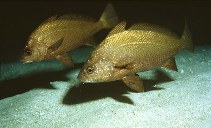| Family: |
Sciaenidae (Drums or croakers) |
| Max. size: |
80 cm TL (male/unsexed); max. reported age: 27 years |
| Environment: |
demersal; marine; depth range 50 - 300 m |
| Distribution: |
Eastern Atlantic: Bay of Biscay to South Africa (Ref. 4373), including the western Mediterranean. Western Indian Ocean: east coast of Africa (Ref. 3490); probably also in the Arabian Sea under synonyms capensis (non Pappe ?), sinuata Day and striata Boulenger. |
| Diagnosis: |
Dorsal spines (total): 11-11; Dorsal soft rays (total): 25-29; Anal spines: 2-2; Anal soft rays: 7-7. Juveniles with narrow oblique dark and light stripes, becoming obscure in adults (Ref. 4373). |
| Biology: |
Found in mud and sandy bottoms of the shelf and upper slope (Ref. 4780), 14° to 15° C (Ref. 36731). Feed on small shrimps, worms and other bottom invertebrates (Ref. 4780). Sold fresh and dried salted (Ref. 3490). |
| IUCN Red List Status: |
Least Concern (LC); Date assessed: 26 September 2018 Ref. (130435)
|
| Threat to humans: |
harmless |
Source and more info: www.fishbase.org. For personal, classroom, and other internal use only. Not for publication.
